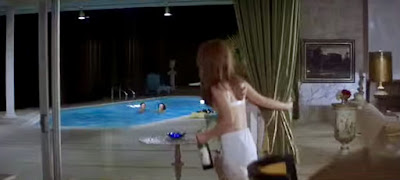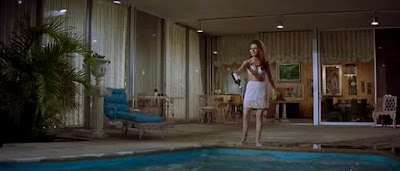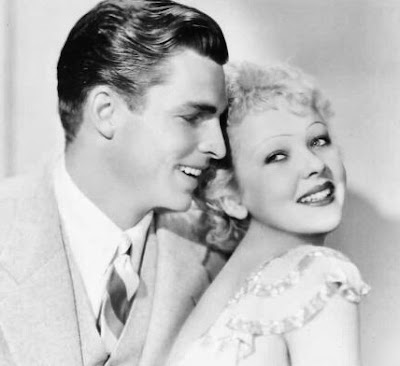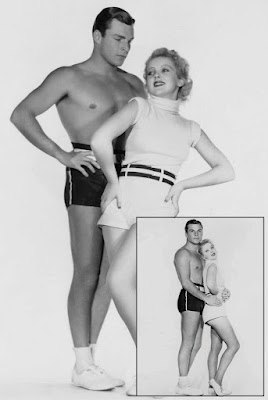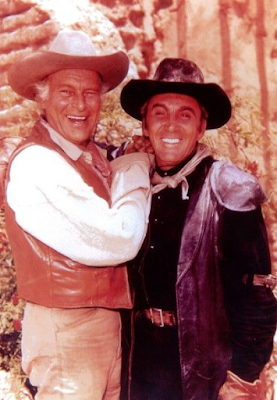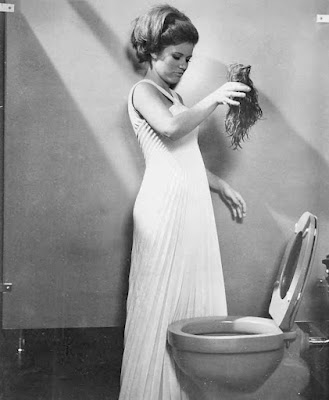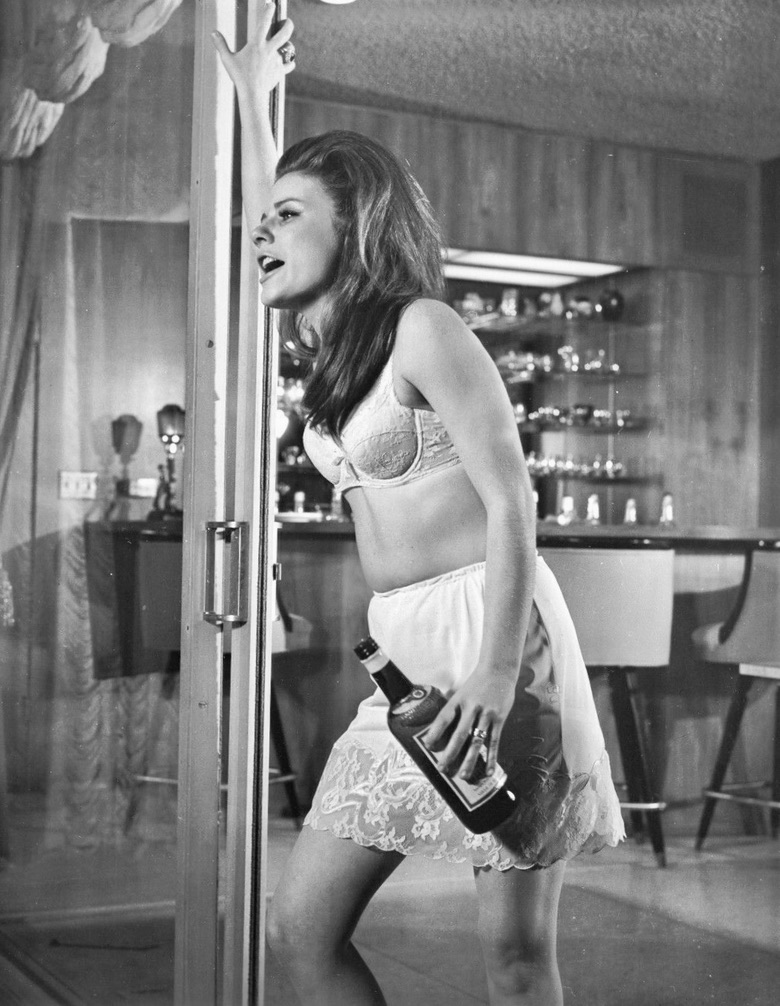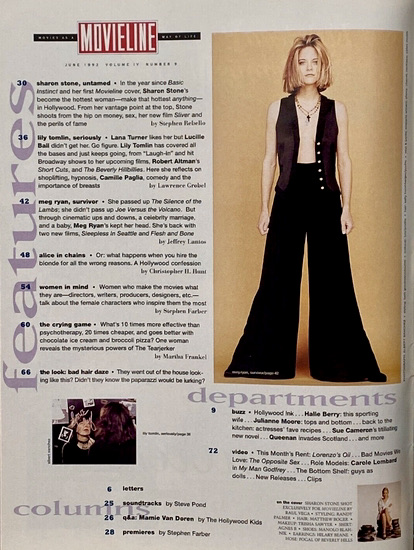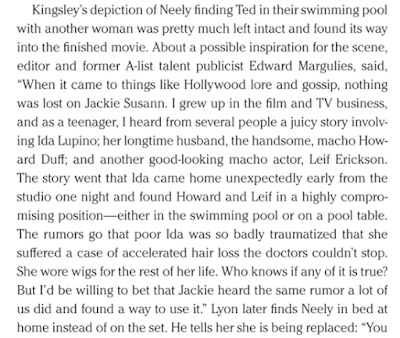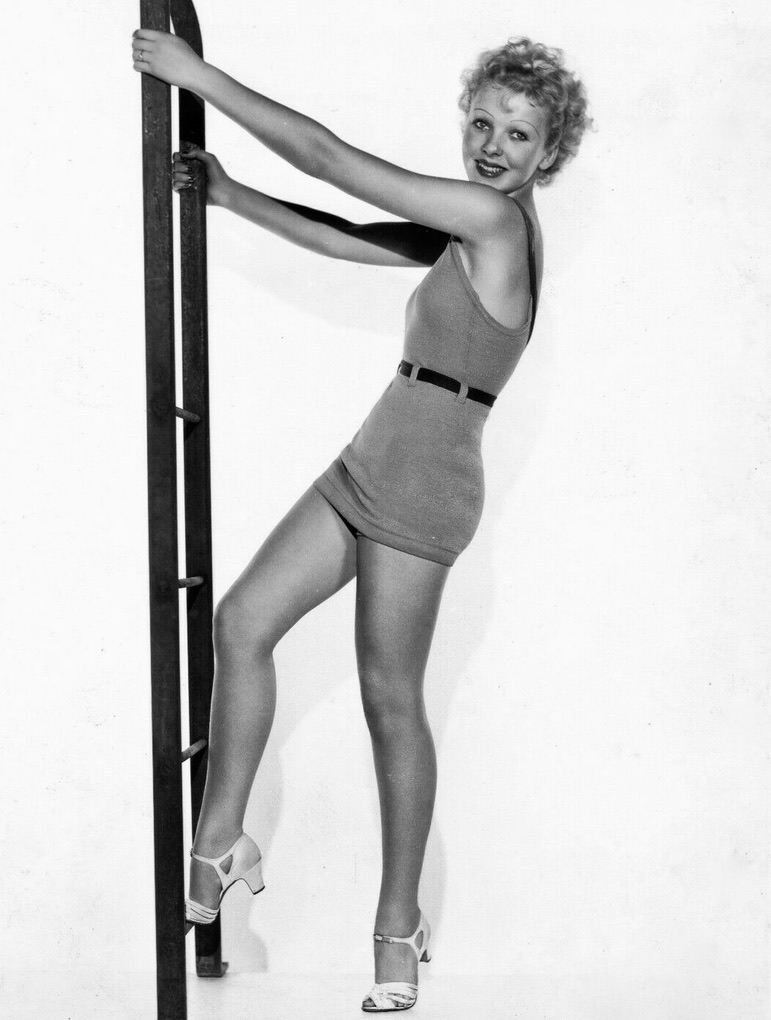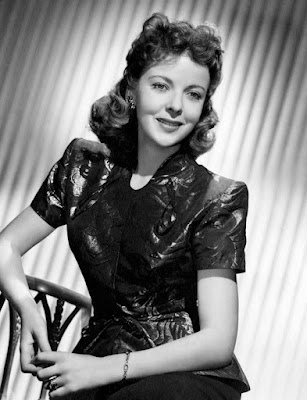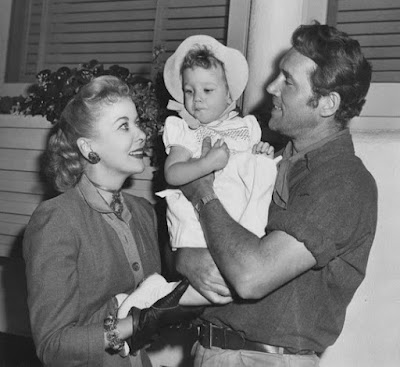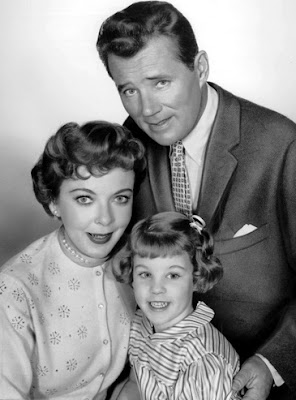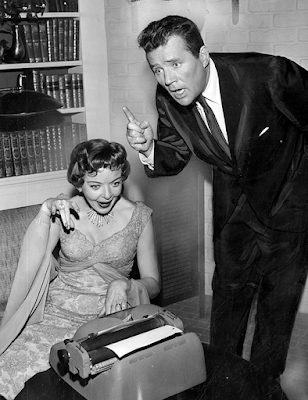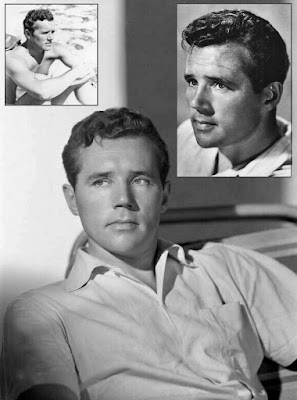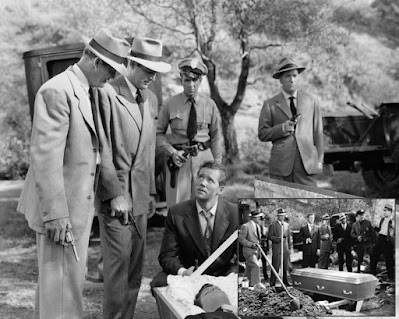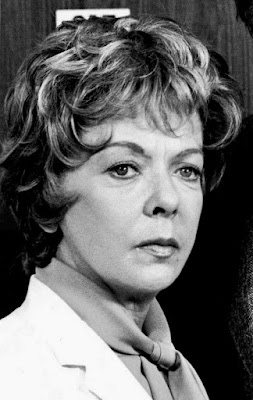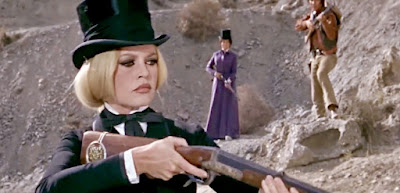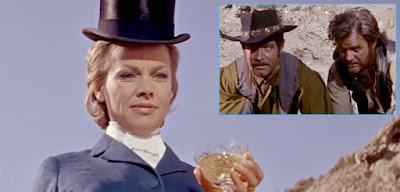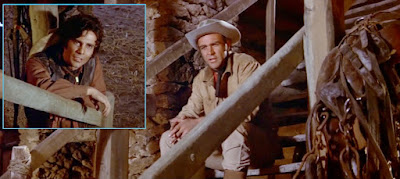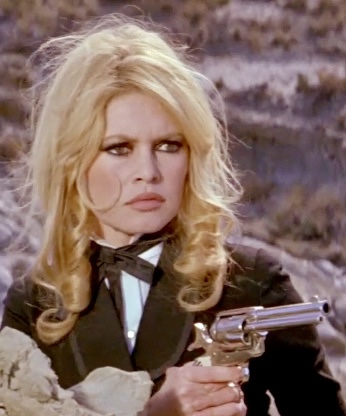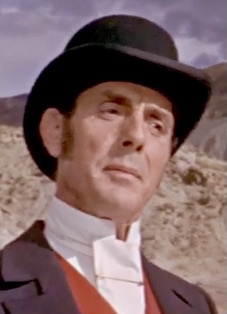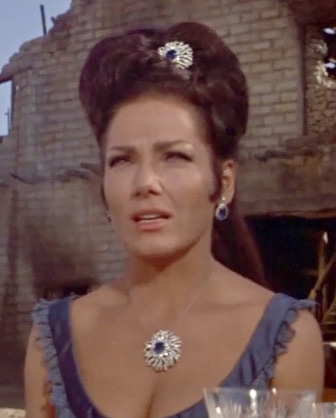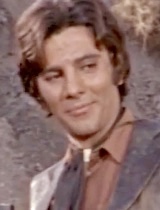 |
Blackman must have had "hay fever" because the result is quite similar...! She soothes her hysteria by giving in to Boyd's roughhouse kissing.
|
 |
The Apache are gone. It's up for debate amongst the survivors as to whether it's for good or just to regroup.
|
 |
As it turns out, any feelings of relief are short-lived as now they are faced with another barrage, this time with the braves either catapulting or jumping a horse over the ranch wall! Again the aristocrats fend them off, then make plans to evacuate.
|
 |
Knox is helping to arranged supplies (over Sykes protestations, the class system still in full effect even now!), but it's all for naught. Boyd has ideas of his own.
|
 |
He holds Van Eyck & Co. at gunpoint, telling them to drop all their weapons and come downstairs.
|
 |
Fending off a band of enraged Apaches wasn't enough. Now the hunting party has to deal with a shifty, selfish Boyd.
|
 |
They can only watch helplessly as Boyd has a stagecoach hooked up with the only remaining horses, pilfers all the food, empties all their rifles of ammunition...
|
 |
...and helps himself to Bardot's box full of expensive jewelry.
|
 |
| This piques the attention of Blackman, who holds things like that a lot more dear than her stuffy old husband. |
 |
Boyd is far from finished, though. Next her takes whatever valuables might still be left on his wealthy former employers. Van Eyck, naturally, objects to this heartily.
|
 |
Leaving nothing to chance, he shoots holes in the last of the water barrels! If there is to be any more shooting at this gallery, they'll be nothing but sitting ducks.
|
 |
The final insult comes when Blackman announces that she is coming with Boyd (to Mexico), much to the disdain of her stunned husband.
|
 |
And with that, Boyd and most of his men (save Barry and Mateos) are off, leaving the group with nothing upon with to survive. But Barry and Mateos do have an ace up their sleeve. It seems Connery had socked away some ammunition under some hay in the stable!
|
 |
There's only one small bucket of water, unfortunately, but Van Eyck suddenly remembers the well...
|
 |
..which turns out to be a total dead end.
|
 |
But you mustn't forget the title of the movie! Connery is back, though without the U.S. Army.
|
 |
He informs the merry band that they will be walking and to travel light. He intends to take them to the top of a nearby plateau where there is water (and a location that's easier to defend than open land.)
|
 |
Bardot wonders aloud if they have a chance at survival, but they all pin their hopes on Connery and start off.
|
 |
Strode is aware that Connery is still about, but doesn't know where he is exactly. His braves are annoyed to discover that the survivors are no longer within the ranch. They set out in hot pursuit.
|
 |
Connery, whose led his followers along the tracks of Boyd's stagecoach, sees the band of Apache warriors approaching.
|
 |
Using, literally, the oldest trick in the book, he puts everyone behind huge rock formations, then he, Barry and Mateos head down and use thatches of sagebrush to disguise the tracks. Once the small band of braves is close enough, Van Eyck (who's just plain contrary at every turn!) wants to kill them.
|
 |
Connery has other ideas! As usual, he's right. Just because there are only six braves on their trail through the pass, there are many more up above.
|
 |
Their day not having gone quite poorly enough, there is next a rattlesnake! And no one can fire a shot at it!! But, as par for the course, Connery is able to improvise.
|
 |
That night, Bardot finds it difficult to sleep. (How could one under the circumstances unless from total exhaustion?!)
|
 |
She seeks out Connery, who's just carved off a hunk of cactus for its water content.
|
 |
Over at Boyd's camp, Blackman has no such qualms when it comes to love. She spends the night in her new lover's arms! (And looks contented for, perhaps, the first time in the movie.)
|
 |
Our band of weary travelers is up and at 'em again, bright and early. Finally, they are within a proper glimpse of the plateau Connery wants them to hide out upon.
|
 |
| The bad news is that he tells them they'll need to go around to the other side of it, which is a 7 to 8 hour trek! Amazingly, Bardot suggests that they climb it from this side (are ya lookin' at this thing?!) But, as it turns out, Van Eyck is a skilled mountain climber, so he can lead the way. |
 |
Onward and upward...
|
 |
Connery follows behind Van Eyck and all of them, the ladies, too, head up the face of this ginormous mountainside.
|
 |
It's probably hard to even see them, but the folks at the bottom of the hiking train are like ants against the magnitude of this formation. But it's a way to freedom.
|
 |
| The members of Boyd's gang are not so lucky. They've continued on the same direction as before and the Apache are closing in. |
 |
Gentleman that he is, Boyd says he's heading up to scout the way further... He does ask if Blackman would like to join him, but she declines. It winds up being a fateful error in judgement.
|
 |
A short while after Boyd has ridden off, the stagecoach is set upon by a band of agitated Apache braves!
|
 |
In hot pursuit, they pick off the cowboys one by one. One of Boyd's pals, in a remarkable lack of chivalry, unhitches the horses from the stagecoach and rides off on one!
|
 |
Boyd, safely ensconced atop a hill, watches as his cohorts are eliminated and the horseless stagecoach careens along, ultimately landing on its side with Blackman still aboard!
|
 |
Still alive, but dazed and dizzy, she crawls out the door of the overturned coach and struggles to flee while one of the cowboys is being tormented by the Apaches.
|
 |
Unable to make it any further, she falls to the ground and feigns death. She nearly gets away with it, too, until...
|
 |
The unsettling episode involving Blackman has helped make it possible for Van Eyck to lead Connery and the others up the mountainside.
|
 |
That's not to say they're out of the proverbial woods yet. Now a whole reassembled war party is engaged to go after them!
|
 |
Connery determines that it will likely be the following morning before any attack comes, but sets up some of the remaining men on sentry duty nevertheless.
|
 |
French attempts to comfort Hawkins who is by now aware that his wife is surely dead.
|
There's a perception that
Shalako was not a hit when released. (And, yes, movies that lose their investment when they hit the marketplace are indeed considered flops!) Thing is, the movie
cost so much, in part due to its stars, that it would have had to be a door-busting blockbuster in order to recoup, and
that it was not. The budget was $5 million and $1.5 million of that (plus percentages) went to the star duo. This was when a movie cost about $1.30 per ticket in the U.S. So while it was a Top 20 flick in its year, it made nothing back to speak of.
And while its true that Bardot and Connery don't light the screen afire with their chemistry, they got along very well (as did everyone) during shooting. For me, the situation boils down to two things. The aforementioned difficulty in understanding Bardot's lines and the fact that Connery is never shirtless. How much heat can one generate in floppy buckskin with a red undershirt on? (Had she watched HIM bathing, this thing might have made its money back! LOL) This photo reveals the problems Sean was having with his hair at the time. It's nothing now for men to be bald - many with thinning hair prefer it, but back in the day, one could almost count on one hand how many stars went that route. It just wasn't done.
Connery had just had a dust-up with producer Albert Broccoli and vacated his successful series of James Bond films. A lifelong fan of westerns, he jumped at the chance to switch gears (in a role that had in its early stages been earmarked for Henry Fonda!) He was soon lured back to the Bond franchise with
Diamonds Are Forever (1971) when United Artists was willing to pay him $1.25 million. Later, he branched out into a wide variety of movies from drama to action to mystery, copping an Academy Award for 1987's
The Untouchables. An unhappy experience throughout
The League of Extraordinary Gentlemen (2003) ultimately led to his retirement. After suffering from the effects of dementia for a time, Connery
passed away in 2020 at age 90.
Bardot was born into wealth in Paris, France, but led a mostly unhappy childhood with highly restrictive parents. This led to a lifelong rebellious streak and a search for passion throughout much of her life. Having met and fallen in love with Roger Vadim while in her teens, he eventually delivered her in
And God Created Woman (1956) which catapulted her to international fame. She enjoyed many hit movies in her native tongue, several of which became worldwide successes. Things were beginning to cool just a bit by this time, though her collaboration with Louis Malle and Jeanne Moreau,
Viva Maria! (1965) had been a smash. Her role here was once earmarked for Senta Berger (when Fonda was the title character.) Ironically, her acceptance of this part prevented her from taking the offer of
On Her Majesty's Secret Service (1969), wherein her star power would help usher in the new, unknown James Bond, George Lazenby. Diana Rigg was cast instead. Tiring of the cinema soon after
Shalako, she made only seven more films, retiring permanently in 1973 at age 39. That's not to say she entirely disappeared, for she became a vociferous animal rights advocate and a very outspoken persona in general, sometimes sparking much controversy. Off-screen drama includes a few suicide attempts and an irreconcilable relationship with her only child, a son who she sadly never wanted. In the wake of many relationships and several marriages, she's been wed for a fourth time since 1992 and is 87.
Boyd was the recipient of his own tribute here years ago. You can read up on his life and career at
this link. Boyd's early cinematic profile had been bolstered by Bardot when she selected him as her leading man in
The Night Heaven Fell (1958), so they shared their own bit of movie history. At the time of
Shalako, Boyd had enjoyed hits like
Fantastic Voyage (1966) and suffered flops like
The Oscar (1966) and had tried his own hand at the spy genre with
Assignment K (1968.) The '70s brought a decided cooling to his movie career, though he continued to work. Unfortunately, he died of a massive heart attack in 1977 at only age 47 while playing golf.
Hawkins had been an esteemed stage actor who emerged in the 1950s as one of Great Britain's most popular big-screen heroes. He sought to expand his range by playing a demanding ruler in
Land of the Pharaohs (1955), which was not able to earn back its considerable budget. As he grew older, he made for a captivating second or third lead in movies like
The Bridge on the River Kwai (1957) and
Ben-Hur (1959), which also featured Boyd, of course.
Lawrence of Arabia (1962) and
Zulu (1964) followed. When Hawkins, a very heavy smoker, began to experience significant vocal issues, he began to work as much as possible, out of fear that his career might come to a close. He was, however, able to continue his screen work even after his larynx was removed in 1966. In
Shalako, and other times, he was dubbed by actor Charles Gray. He died in 1973 from complications following further (experimental) throat surgery, having never stopped smoking (!) at age 62. You may have forgotten, as I had, that he'd been married from 1932-1940 to Jessica Tandy! His second marriage lasted until his death.
Van Eyck was a cinch to play a German nobleman since he was born into German aristocracy to begin with! He fled the country at age 20 as the political situation there was worsening, ultimately winding up in New York where he worked with Orson Welles' Mercury Theatre Group. In early-1940s Hollywood, he found work as villainous Nazis in various movies. But after pearl Harbor, he became a U.S. citizen and joined the U.S. Army. Later reigniting his acting career, he won a role in
The Wages of Fear (1953), followed by
Night People (1954) and
Tarzan's Hidden Jungle (1955.) Steady work followed in many international productions until 1969 when a minor injury led to infection and his death at only age 57. Interesting trivia tidbit: When he left Berlin as a youth, he'd (perhaps unknowingly?) impregnated a young singer who later had an abortion with the aide of a gay English writer. That writer was Christopher Isherwood and he turned the whole scenario into a book which would ultimately become the basis for
Cabaret (1972.)
Blackman started on stage before segueing to films in the late-1940s. Though she continued on the stage, often in musicals, she made films like
A Night to Remember (1958) and
Life at the Top (1965), a sequel to
Room at the Top (1959.) Hands down her most famous movie role was that of Pussy Galore in
Goldfinger (1964), though she was also the first partner of Patrick Macnee on
The Avengers to considerable acclaim. She only vacated that role in order to make the Bond film. Blackman stayed active on TV, on stage and in the occasional movie for a long while, retiring in 2015. She passed away in 2020 of natural causes at the age of 94.
Strode was one of the most impressive physical specimens of his day. As a youth, he'd turned his high school on its ear with his performances in shot put and the high jump. He attended and played football for UCLA before serving in WWII. After that, he played for the L.A. Rams (who are currently about to take on my city's Bengals in the Super Bowl on Sunday!), one of the first black players in the post-war league. Having dabbled in acting as a youth (as a native or chauffeur), he reentered the movies where his imposing physicality was put to use as tribal chiefs or men of adventure. Things turned a corner in 1959 when he won a key role in
Pork Chop Hill, followed by featured parts in
Spartacus,
The Last Voyage and
Sergeant Rutledge, his most notable role, all in 1960. Sustaining a meaningful career was a challenge to say the least, but he remained very busy always. During the time of
Shalako, he was living and working in Europe. His casting as a Native American raised eyebrows among some (then and now), but Strode actually had Creek and Cherokee blood in his ancestry. John Ford, who'd gone to bat for Strode's casting in
Rutledge, became a very close friend until the end of his life, with Strode at Ford's side at his death. Strode made many westerns, some quite notable, and the cowboy Woody in the
Toy Story series was named after him. He died in 1994 at age 80 from lung cancer, his final film, appropriately,
The Quick and the Dead, came out the year after.
Sykes was a comedy writer-turned-performer who took small, funny roles in movies while also headlining his own comic series
Sykes and A... Despite being amazingly busy as a writer and working steadily as an actor as well, he was almost completely deaf and legally blind! His movies include
Those Daring Young Men in Their Jaunty Jalopies (1969) and
Theater of Blood (1973) among many others. He popped up in 2005's
Harry Potter and the Goblet of Fire. His final role in an episode of
Poirot came in 2010 and he passed away in 2012 of kidney failure and heart disease at the age of 89. It may interest you to know that among his voice-over work was announcing the title characters on the cult kiddie TV show
Teletubbies!
Canadian actor Knox had done plenty of stage work, but not a lot in films before Darryl F. Zanuck selected him to portray the title character in his pet project
Wilson (1944), all about Woodrow Wilson. Though he was Oscar-nominated for the (flop) film, the statuette went to Bing Crosby for
Going My Way. While Knox wasn't definitively blacklisted during The McCarthy Era, he did see a degree of trouble when it came to working steadily after being investigated, so he moved to England and embarked on a lengthy career there. He appeared in many notable films including
The Vikings (1958),
The Longest Day (1962),
Modesty Blaise (1966),
Nicholas and Alexandra (1971), among others. Retiring in 1986, he died in 1995 of bone cancer at age 88. He'd been married to actress Doris Nolan for more than 50 years when he passed away.
Pretty British (not French, as one might expect!) actress French was a beauty queen who came to Hollywood in the mid-1950s with hopes of a big-screen career. She did costar with Glenn Ford in
Jubal (1956) and appeared in the troubled production
The Garment Jungle (1957), but after the westerns
Decision at Sundown (1957, with Randolph Scott) and
The Hard Men (1957, with Guy Madison), things cooled and she worked more on television or in low-budget affairs. She also found some success on the Broadway stage (causing a stir in one show by appearing nude - with her back to the audience - on stage.) She worked a bit on the New York based soaps
One Life to Live and
All My Children in the late-1970s. Leukemia claimed her in 1990 at age 62.
Spanish actor Mateos will only be familiar to U.S. viewers who've seen productions (like
Shalako) which were filmed there. He appeared in
Return of the Seven (1966), one of the sequels to
The Magnificent Seven (1960) with Yul Brynner,
Four Rode Out (1967) and
The Kashmiri Run (1970), both with Pernell Roberts and
Catlow (1971) with Yul Brynner and Dana Wynter. Mateos exited screen acting in 1981 after having played Miquel de Cervantes in a TV program and passed away of lung cancer at only 58 in 1996.
Barry, nicknamed "Red" after having starred in the serial
The Adventures of Red Ryder in 1940, had a colorful life to go with his nickname. Stout and only 5'4" tall, he was pugnacious and tough nonetheless (or perhaps because of it.) He was spotted by John Wayne during a football game and came to Republic Pictures to work, but - even as he worked steadily - ran into various troubles with some of the studio's directors. During
I'll Cry Tomorrow (1955), he met and began a relationship with star Susan Hayward. One morning, his ex-fiance, curvy actress Jill Jarmyn, came in the back door for an impromptu visit and got clobbered by a pajama-clad Hayward with a hairbrush! Jarmyn (who's apparently alive today in her late-90s!) was pressured into dropping a battery charge, though the incident made the papers. Barry worked on countless TV shows and in many movies, busy as a bee, despite his reputation for being difficult. In 1980, estranged from his third wife, he shot himself to death at age 68.
Finally (you thought this effing post was never going to end, didn't you?!), we come to Dutch actor De Vries. Lanky and handsome, he'd begun with bit roles on British TV, often in military parts. He worked on
The Saint and
Doctor Who. He also played a technician in
You Only Live Twice (1967.) In yet another connection between Shalako and the James Bond films, De Vries was on the short list to take over the 007 role in
On Her Majesty's Secret Service, but lost out to George Lazenby. He was one of several young men photographed for a 1968 issue of Life magazine in poses that suggested the famed secret agent. Afterwards, he did a few more roles on British TV (such as on
UFO and
The Onedin Line) before receding from view. He died in 2018 at age 76 after grappling with a chronic illness.
Just a few bonus photos to round out this never-ending entry at Poseidon's Underworld!
 |
Blackman galore, in the hay again!
|
 |
De Vries, shaken, but not stirred.
|
 |
Bardot, showing more to a still photographer than any viewer of the movie got to see! Which brings us at last to...
|
 |
The End!
|
The film can be viewed in a decent wide-screen print
right here.
